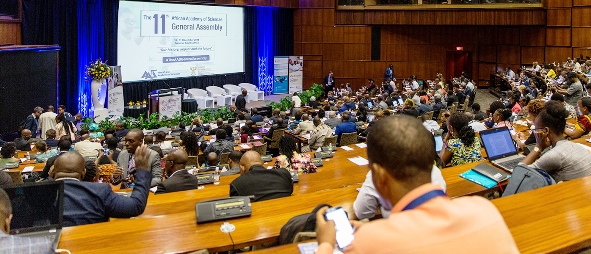African Academy of Sciences 15th General Assembly Highlights Call for Scientific Sovereignty and R&D Investment
The 15th Bi-Annual General Assembly and Scientific Conference of the African Academy of Sciences (AAS) opened on December 9, 2024, in Abuja, Nigeria, under the theme “Empowering and Advancing Africa’s Scientific Enterprise.” The four-day conference brought together prominent African scientists, policymakers, and development experts to address the continent’s research challenges and opportunities for growth.
RELATED: Op-ed: African solutions to African problems: Reframing science innovation
Reviving Africa’s Scientific Legacy
In his keynote address, Professor Kevin Chika Urama, Chief Economist and Vice President of the African Development Bank Group, celebrated Africa’s historical contributions to global science, from early toolmaking to astronomical observations. However, he warned of the urgent need for reform to reclaim Africa’s role in the global scientific community.
“Africa had great beginnings in shaping global science and technology,” Urama said, “but less than 1% of patents granted worldwide in 2023 were attributed to African individuals or enterprises.”
Despite a 135% increase in African scientific publications between 2014 and 2022, as reported by AAS President Professor Lise Korsten, challenges such as brain drain, underfunding of research, and marginalization in global science discourse continue to hinder progress.
The Challenges and Solutions
Professor Urama identified several critical obstacles and provided actionable recommendations:
- Underfunding of R&D
- Most African nations fail to meet the African Union’s target of allocating 1% of GDP to Research and Development (R&D).
- Brain Drain
- The Mo Ibrahim Foundation estimates that Africa loses $2 billion annually in the health sector alone due to professionals emigrating abroad.
- Marginalization in Global Science
- African knowledge and perspectives remain underrepresented in global scientific discourse and policy-making.
Proposed Solutions:
- Reform monetary and fiscal policies to encourage private-sector investment in R&D.
- Leverage brain circulation by creating opportunities for African researchers to contribute from within and outside the continent.
- Align research priorities with practical development challenges in Africa.
- Mobilize domestic savings and capital to fund scientific infrastructure and innovation.
- Enhance international partnerships while fostering local expertise.
AAS’s Vision for the Future
The conference also emphasized the importance of rebranding the AAS to strengthen its role in Africa’s development. Professor Friday Okonofua, Secretary-General of AAS, outlined plans to improve the Academy’s visibility and impact.
“Together, we can make African scientists work for Africa’s development,” said Okonofua.
Urama echoed this sentiment, calling for Africa to invest in its scientific and technological capabilities to avoid remaining an “impoverished appendage to the global economy.”
Context and Global Implications
The AAS conference comes at a time when Africa’s scientific community is poised to address critical challenges such as climate change, public health, and sustainable development. By prioritizing investments in science and innovation, African nations can boost productivity, drive economic growth, and secure a sustainable future.
Call-to-Action (CTA)
Learn more about how the African Academy of Sciences is empowering African science for sustainable development. Discover the strategies and innovations shaping Africa’s future. Read
Urama’s keynote address here.

































